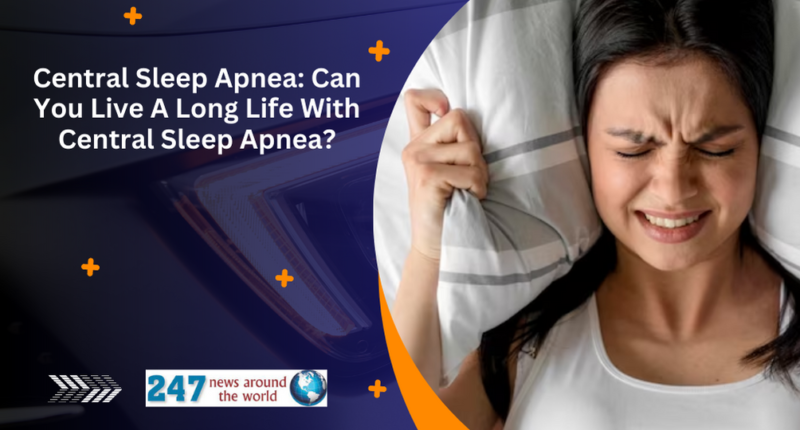Sleep apnea is a common sleep disorder that affects millions of people worldwide. Central sleep apnea (CSA) is a type of sleep apnea that is less prevalent but equally concerning. In CSA, the brain fails to send the proper signals to control breathing during sleep, leading to interruptions in breathing. This article will explore the impact of CSA on a person’s life expectancy and how it can be managed to ensure a long and healthy life.

Understanding Central Sleep Apnea
What is Central Sleep Apnea?
Central sleep apnea differs from obstructive sleep apnea (OSA), which is the more common form. In OSA, the airway is physically blocked, causing breathing interruptions. On the other hand, CSA occurs when the brain’s respiratory control centers fail to send the necessary signals to initiate breathing during sleep.
Identifying the Symptoms
The symptoms of central sleep apnea (CSA) can vary from person to person. However, some common symptoms include:

- Excessive daytime sleepiness. This is the most common symptom of CSA. People with CSA often feel tired even after a full night’s sleep. They may also have difficulty staying awake during the day, and they may doze off at work, while driving, or while watching TV.
- Waking up with a dry mouth or headache. This is another common symptom of CSA. The dry mouth is caused by the lack of air flow during sleep, and the headache is caused by the drop in blood oxygen levels.
- Loud snoring. Snoring is not always a sign of CSA, but it can be a symptom. If you snore loudly and your bed partner reports that you stop breathing during sleep, you may have CSA.
- Episodes of gasping or choking during sleep. These episodes can be frightening for the person with CSA and their bed partner. They are caused by the brain’s inability to signal the body to breathe.
- Difficulty concentrating or thinking clearly. This is a less common symptom of CSA, but it can be a sign of more severe cases. People with CSA may have trouble paying attention, remembering things, or making decisions.
If you experience any of these symptoms, it is important to see a doctor. CSA can be a serious condition, but it can be treated with medication or therapy.
In addition to the symptoms listed above, people with CSA may also experience:
- Mood changes. People with CSA may be more irritable, depressed, or anxious than usual.
- Memory problems. People with CSA may have trouble remembering things that they have recently learned.
- Trouble sleeping at night. People with CSA may find it difficult to fall asleep or stay asleep at night.
- Night sweats. People with CSA may experience night sweats, which are episodes of sweating that occur during sleep.
If you are concerned that you may have CSA, it is important to see a doctor. A doctor can perform a sleep study to diagnose CSA and recommend treatment.
Here are some tips for identifying the symptoms of CSA:
- Pay attention to your sleep habits. If you find yourself waking up feeling tired even after a full night’s sleep, or if you have trouble staying awake during the day, you may have CSA.
- Talk to your bed partner. If your bed partner reports that you snore loudly or that you stop breathing during sleep, you may have CSA.
- Be aware of other symptoms. In addition to excessive daytime sleepiness and snoring, CSA can also cause other symptoms, such as difficulty concentrating, mood changes, and night sweats.
If you think you may have CSA, it is important to see a doctor for diagnosis and treatment. With proper treatment, you can improve your sleep quality and reduce your risk of complications.
Risk Factors
Several risk factors increase the likelihood of developing (CSA). Understanding these risk factors can help identify individuals who may be at higher risk and may benefit from early intervention and management.

- Heart Disorders: Individuals with certain heart conditions, such as congestive heart failure or atrial fibrillation, are at an increased risk of developing central sleep apnea. The interaction between heart function and the brain’s respiratory control can lead to breathing disruptions during sleep.
- Brainstem Injuries: Any injury or damage to the brainstem, the region responsible for regulating breathing, can lead to CSA. Traumatic brain injuries, strokes, or neurological disorders affecting the brainstem can all contribute to CSA.
- Opioid Use: The use of opioids, especially in high doses, can suppress the central nervous system and respiratory drive. This suppression can lead to irregular breathing patterns during sleep, causing central sleep apnea.
- Living at High Altitudes: People residing at high altitudes, where the air contains lower oxygen levels, may experience periodic breathing abnormalities during sleep. This condition, known as Cheyne-Stokes respiration, is a type of central sleep apnea often associated with altitude.
- Age and Gender: Central sleep apnea is more commonly seen in older individuals and is more prevalent in men than in women.
- Certain Medical Conditions: Certain medical conditions, such as renal failure and stroke, can increase the risk of central sleep apnea.
- Medication and Substance Use: Some medications and substances, including sedatives and alcohol, can suppress the central nervous system and contribute to breathing irregularities during sleep.
- Obesity: Excess weight and obesity can affect the respiratory control system, leading to breathing disruptions during sleep, including central sleep apnea.
- Family History: A family history of sleep apnea, including central sleep apnea, may indicate a genetic predisposition to the disorder.
- Smoking: Smoking can irritate the airways and contribute to respiratory problems, potentially increasing the risk of central sleep apnea.
It is important to note that having one or more risk factors does not guarantee the development of central sleep apnea. Conversely, some individuals with no apparent risk factors may still develop CSA. If you suspect you or someone you know may have central sleep apnea, it is crucial to seek medical evaluation and proper diagnosis to initiate appropriate treatment and improve overall sleep and health outcomes.
The Impact on Life Expectancy
People diagnosed with central sleep apnea often wonder about the impact it may have on their life expectancy.
Understanding the Connection
Research has shown that central sleep apnea can be associated with other underlying medical conditions that can affect life expectancy. These conditions may include heart failure, stroke, and other cardiovascular issues.
Effect on Cardiovascular Health
CSA puts additional strain on the cardiovascular system due to fluctuating oxygen levels. Over time, this strain can contribute to the progression of heart diseases, which may affect life expectancy.
The Role of Treatment
The good news is that appropriate treatment can significantly improve outcomes for people with central sleep apnea.
The specific treatments for CSA vary depending on the underlying cause. However, some common treatments include:
- Positive airway pressure (PAP) therapy: This therapy uses a machine to deliver pressurized air through a mask that you wear over your nose and mouth while you sleep. PAP therapy helps to keep your airways open during sleep, which prevents apneas.
- Supplemental oxygen therapy: This therapy provides you with additional oxygen while you sleep. Supplemental oxygen therapy can help to improve your blood oxygen levels and reduce your risk of complications.
- Medications: Some medications can help to improve your breathing during sleep. However, medications are not always effective for CSA, and they may have side effects.
If you have been diagnosed with CSA, it is important to work with your doctor to develop a treatment plan that is right for you. With proper treatment, you can live a long and healthy life with CSA.
Here are some additional things you can do to improve your lifespan with CSA:
- Get regular exercise. Exercise can help to improve your overall health and reduce your risk of complications.
- Eat a healthy diet. A healthy diet can help to keep your blood pressure and cholesterol levels in check, which can reduce your risk of heart disease.
- Manage stress. Stress can worsen CSA symptoms, so it is important to find healthy ways to manage stress.
- Get enough sleep. Getting enough sleep is essential for overall health and well-being.
If you have any questions or concerns about CSA, be sure to talk to your doctor.
Managing Central Sleep Apnea
Lifestyle Changes
Certain lifestyle changes can positively impact central sleep ap. These include maintaining a healthy weight, avoiding alcohol and sedatives, and sleeping on one’s side.
Positive Airway Pressure Therapy
Continuous positive airway pressure (CPAP) machines are often used to treat central sleep apnea. CPAP delivers a steady stream of air to keep the airway open during sleep.
Adaptive Servo-Ventilation (ASV)
ASV devices are designed specifically for CSA and can adjust airflow based on the patient’s breathing patterns.
Medications
In some cases, medications may be prescribed to stimulate breathing during sleep and reduce the frequency of apnea episodes.
Conclusion
Central sleep apnea is a serious sleep disorder that can impact a person’s life and health. However, with proper diagnosis and appropriate treatment, individuals with central sleep apnea can lead fulfilling and long lives. It is essential to seek medical attention if you suspect you or a loved one may have central sleep apnea to improve overall well-being and ensure a good quality of life.
FAQs
- Is central sleep apnea curable? CSA can be managed effectively with proper medical treatment, but it may not always be completely curable.
- Can central sleep apnea lead to other health complications? Yes, CSA can contribute to other health issues, especially cardiovascular problems.
- Are there any home remedies for central sleep apnea? While lifestyle changes can help, it is crucial to consult a healthcare professional for proper evaluation and treatment.
- Can children have central sleep apnea? Yes, CSA can affect both adults and children, but it is relatively rare in the pediatric population.
- Is snoring a symptom of central sleep apnea? Snoring is more commonly associated with obstructive sleep apnea, but it can also occur in some cases of central sleep apnea.
You may also like | 7 Full Body Mobility Exercises to Boost Your Health and Fitness






